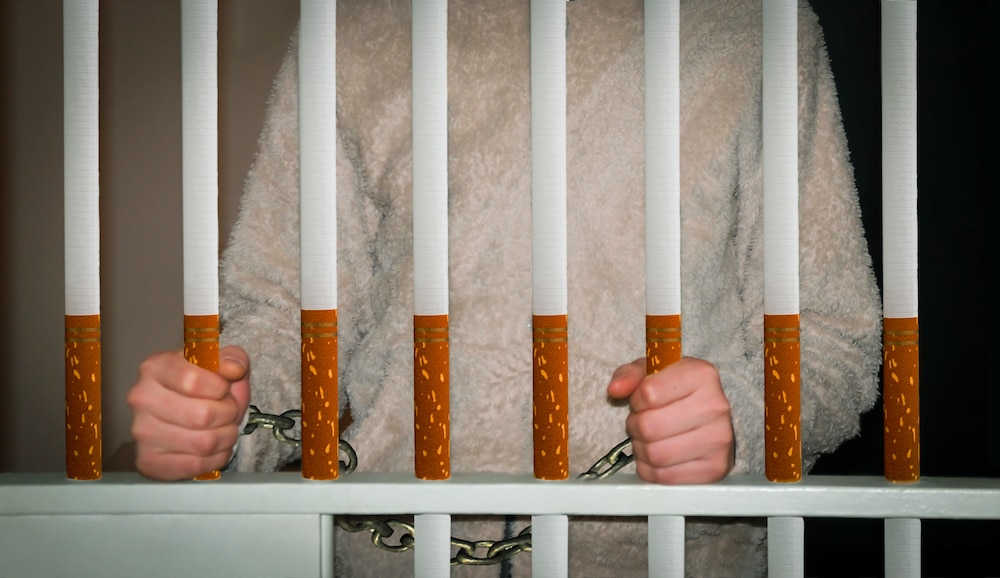Smoking will be banned in Canberra’s prison, the Alexander Maconochie Centre, by mid-year, and Cancer Council ACT will help detainees and staff to quit smoking, ACT corrections minister Mick Gentleman announced today.
The ACT government announced last year that smoking would be banned in prison. The ACT is one of only two jurisdictions that still permits smoking in some correctional facilities, Mr Gentleman noted then. (The other is Western Australia.) Smoking is banned in all other ACT government buildings, including the secure mental health facility.
- Smoking will be banned at Canberra prison (1 September 2022)
The Blueprint for Change: A New Future for Custodial Services report (2022) recommended that tobacco should be removed from the AMC. It identified smoking in the prison as a major cause of risk. Detainees used lighters to start fires, often causing significant cost and disruption. Tobacco was used as a form of currency that resulted in violence and standover tactics between detainees, and as an aid to deescalating antisocial behaviour.
Approximately 82 per cent of prisoners smoke, and 14 per cent first took up smoking when they were in detention, according to survey data collected from inmates in 2016. 60 per cent of respondents had tried to quit smoking while in detention, and 67 per cent indicated they would like to quit smoking.
Verity Hawkins, CEO of Cancer Council ACT, said onsite intervention training for staff and detainees would help them understand and support one another to quit smoking.
“Through this training, Cancer Council ACT is pleased to support measures to reduce exposure to smoking and second-hand smoke in workplaces, or where people are unable to avoid it,” Ms Hawkins said.
Nicotine Replacement Therapy will be available in the form of nicotine patches and lozenges, Mr Gentleman said. More than 150 detainees already use NRT.
Detainees will also have access to diversionary activities such as exercise, art, barbecues, along with QUIT resources, Justice Health Services, and the Winnunga Health Clinic for ongoing support.
The Winnunga clinic will continue to provide support and nicotine replacements for Aboriginal and Torres Strait Islander detainees who wish to quit smoking, Julie Tongs OAM, CEO of Winnunga Nimmityjah Aboriginal Health and Community Services, said.
However, Ms Tongs said she had a number of concerns about how the ACT Government was implementing its total ban on smoking.
“Firstly, there is no such thing as a smoke-free prison,” Ms Tongs said. “They will turn a legal substance into another contraband in the prison environment where it is already about power and control over the powerless.
“In other prisons, the price of tobacco is as expensive as illicit drugs. The AMC is one of the most violent prisons in the country, and much of this stems from boredom and relentless lockdowns due to staffing shortages and no capacity to remove the offenders without punishing the whole prison population.
- ROGS: Indigenous overrepresentation in ACT justice system worsening (3 February 2023)
- Review finds conditions for ACT prisoners have worsened (30 November 2022)
- ‘Time warp’: Winnunga critical of mental health reforms at AMC (10 August 2022)
- ACT’s $20M response to Aboriginal overincarceration ‘not enough’ (27 July 2022)
- Report into strip search at AMC: Human rights must be considered (17 September 2021)
- Government rejects Liberals’ call for racism investigation at AMC (11 February 2021)
- Indigenous advocates furious government rejected proposed AMC inquiry (11 February 2021)
“The detainees are bored s**tless in that place. If they think that exercise, barbecues, and giving them a patch or a lozenge will help them to quit, then they are all delusional.
“My original understanding was that it would be mandatory for staff and detainees, and now the Minister … has stated that staff would be supported to quit if they wish, too. We need a union for detainees.
“Most of us know that all contraband that gets into prisons doesn’t magically come over the fence. Much of it walks through the doors.”
Attempts to ban smoking in UK prisons had mixed results, Volteface, a drug harm minimisation research and advocacy organisation, reported in 2018. Ex-inmates, staff, and charities believed that the ban was done for the government’s own interests – to avoid compensation cases for exposure to second-hand smoke – rather than for prisoners’ health.
Tobacco – the only drug permitted in jails – helped prisoners deal with mental health issues, Volteface wrote. Banning smoking increased violence, bullying, disorder, unrest, and riots; and anxiety, self-harm, and suicide. Illicit tobacco markets proliferated, as did contraband and smuggling. The use of nicotine patches sharply increased, resulting in near-fatal casualties and hospitalisations. Non-smokers were put in a more vulnerable position if sharing a cell with a covert smoker.
The ACT Government maintains, however: “Transitioning to a smoke-free AMC is the right decision to support the health and wellbeing of our staff and detainees.
“Detainees are being supported throughout the transition and will not have to quit ‘cold turkey’. Detainees will be kept informed of the supports available and key upcoming transition activities, such as the gradual reduction of tobacco being available in the AMC.”



